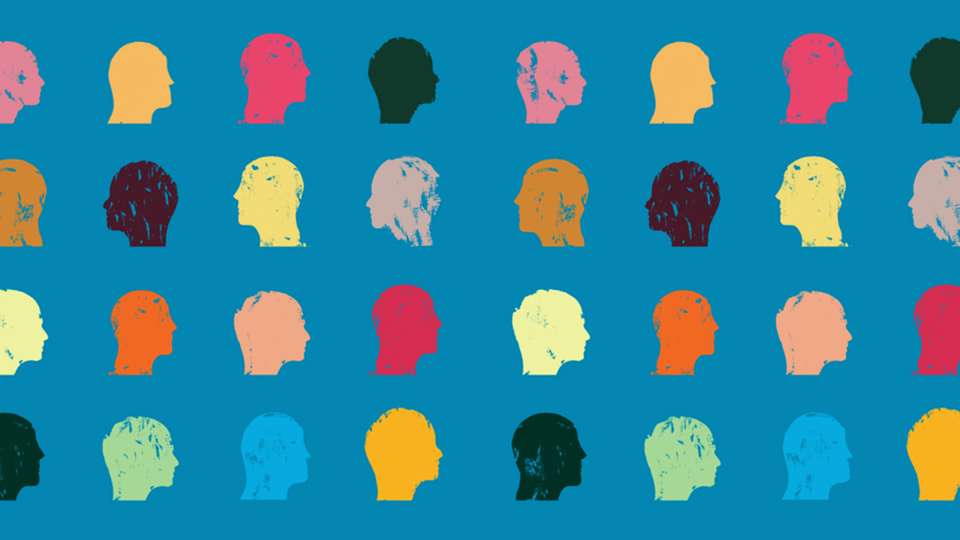
When we talk about diversity, one type is often left out: neurodiversity. In a culture that counts “great minds think alike” among its values, people whose brains work a little differently are often ignored or excluded.
Change is happening, though, as more people recognize that neurodiversity is an important part of human diversity.
What is neurodiversity?
Neurodiversity describes the wide range of neurological functioning that exists among humans and the many ways human brains differ from each other.
Some of these differences have a history of being pathologized, while the people with the differences have been seen and treated as lesser than. All types of brain functioning are valid, however, and none is inherently better or worse than another.
Both neurodivergent and neurotypical people are part of neurodiversity. Neurodivergent people have brain function that is different from what is considered common or neurotypical by Western medicine. This is problematic in that it sets neurotypical people up as “normal” and neurodivergent people as “abnormal,” but it is currently the way neurodivergence is understood.
“It is powerful to realize that neurodivergence has to do with how someone’s brain is structured and functions, it’s a part of the variability in humans and life and it makes life on earth exciting and interesting and beautiful,” says Annette Estes, director of the University of Washington (UW) Autism Center.
What are different types of neurodivergence?
Describing neurodivergence can be difficult because standard medical diagnoses of it are framed around identifying problems.
“Two common examples of neurodivergence, autism and attention-deficit/hyperactivity disorder (ADHD), are defined in the diagnostic manual solely as a collection of impairments,” says Lucas Harrington, a psychologist at the UW Autism Center. “In contrast, individuals with these neurotypes often emphasize the commonly associated strengths and quirks as an equally important part of their autistic or ADHD identities.”
That being said, autism, ADHD, dyslexia and other types of learning and intellectual disability are all current ways people describe neurodivergence.
Some people include traumatic brain injury (TBI) and mental illnesses like anxiety, depression and obsessive-compulsive disorder (OCD) in discussions of neurodiversity because of the way these conditions can alter brain functioning.
Sometimes, you’ll see people use labels like “low-functioning” or “high-functioning” to describe someone who is neurodivergent. While it is true that some neurodivergent people may need more support than others, functioning terms are problematic because they place value judgments on human beings and suggest some are more valuable members of society than others.
Instead, talking about someone in terms of how much care they need is a better way to go. For example, you could describe someone as living independently or needing certain types of support.
Is neurodivergence bad?
Historically, neurodivergence has been considered bad or undesirable, but ultimately it is just a difference. Like any difference, it can cause challenges as well as bring opportunities. For example, research has shown that autistic people outperform neurotypicals in some ways and have perspectives and insights that neurotypical people do not.
“The thing that the neurodiversity movement has brought into focus for me is that even if someone is struggling with a challenge that they themselves would like to mitigate (such as uncomfortable levels of anxiety and difficulty focusing) that person should be valued and treated with respect as an autonomous person, not just seen only through the lens of individual pathology,” Estes explains. “And the social model of disability should be given due weight so adjustments to the environment can be considered as well as asking the person to change.”
There is a lot of negativity and paranoia around autism in particular (for one, the longstanding myth that vaccines cause autism — which they don’t). While parental concern is understandable, a diagnosis of autism or a different type of neurodivergence does not mean your child is doomed. In fact, neurodivergent people can live happy, fulfilled lives, especially when they receive support and acceptance.
For Harrington, being autistic is part of his identity, similar to how being Jewish and transgender are parts of his identity.
“Embracing neurodiversity doesn’t mean no one wants medication or treatment, it means we want people to decide for themselves if they want it and have access to it,” he explains.
It’s also important to note that every aspect of someone’s identity, from their race to their socioeconomic status, interacts with their neurodivergence and will make their experience of neurodivergence different.
Is neurodivergence a disability? A mental illness?
Neurodivergence can be associated with disability and mental illness but not in all cases.
Some people who are neurodivergent may also have a disability, or their neurodivergence may be disabling in certain circumstances, Estes says.
When thinking about how disability interacts with neurodivergence, considering how society inhibits disabled people is important, Harrington says.
“The traditional way of thinking about disability is a medical model that says it’s inherent in the person, that they deviated from the ‘ideal’ person functioning,” he says. “The social model of disability is that the disability is an interaction between a person and their environment: It occurs when there’s a mismatch between what they can do and what they’re expected to be able to do.”
Many types of neurodivergence, such as autism and ADHD, are listed in the Diagnostic and Statistical Manual of Mental Disorders (DSM-5).
Neurodivergence is often different from mental health conditions, like anxiety or depression, because it doesn’t appear suddenly in adulthood or after a pivotal experience. (There are exceptions, such as schizophrenia, which often begins in someone’s 20s or 30s; along with treatment-resistant depression and PTSD.)
Neurodivergent people can also be diagnosed with other mental health conditions. In fact, two of every three people with ADHD have another condition such as anxiety, depression or OCD, and autistic people are at higher risk for mental health conditions.
Am I neurodivergent? Is there a test I can take?
There are lots of neurodivergence quizzes on the Internet, most of which aren’t that accurate. But learning about types of neurodivergence from reputable online resources can be helpful, especially if you think you are neurodivergent, and some people in the neurodivergent community encourage self-diagnosis. Not all neurodivergent people will seek an official diagnosis, but some may find it helpful.
Diagnosis by a professional is more accurate but can be tricky because diagnostic criteria for things like autism and ADHD were developed primarily around boys. With autism, for example, girls often have different symptoms and don’t get diagnosed as early or at all.
“When I make a diagnosis, I talk about how the diagnosis means the conventional instruction manual gets thrown out. Every autistic person is so different; there is no manual for each one, you’re writing a manual as you go,” Harrington says.
If you’re interested in a diagnosis for yourself or your child, talk with your doctor or your child’s doctor. You can also consult with providers who specialize in treating neurodivergence, such as the experts at the UW Autism Center.
How can I support neurodiversity?
Whether people you care about are neurodivergent or you want to support neurodivergent individuals in a work or school environment, here are some tips for how to foster neurodiversity:
- Accept that neurodivergence is part of human diversity.
- Recognize that neurodivergence does not define someone, but it can be an important part of their identity.
- Recognize that no two neurodivergent people are the same; they will have different goals and needs.
- Advocate for practices that accept and accommodate neurodivergence. You can do this in any space you frequent, such as an office, school or another group.
- Speak up if you hear or see someone being prejudiced against someone who is neurodivergent.
- Be an ally for neurodivergent people by telling them they can come to you if they need to talk or need help — and show humility by listening to their needs rather than imposing your ideas of what you think they need.
- Celebrate the people you care about who are neurodivergent.

 Healthy ideas for your inbox
Healthy ideas for your inbox





